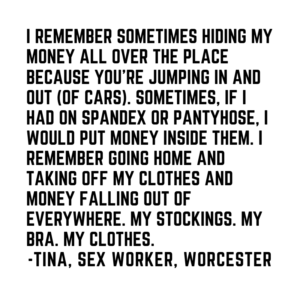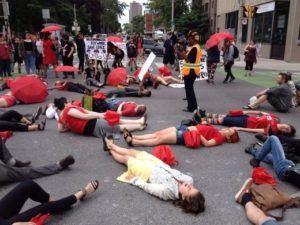Voices of Sex Workers
Why Sex Workers?
Sex work is highly stigmatized. Even in a society where conversations about sexual freedom, consent, and sexual repression are making headlines, there is still not a place for sex workers to share their stories. As a project designed to address archival silences, we decided to create a space where documents that include sex workers voices are organized around the themes they talk about. This is in the hope that this will allow others to understand the lives that these people live and to disprove some of the worst misconceptions about the profession.
What is Sex Work?
Sex work is considered to be “the exchange of sexual services, performances, or products for material compensation. It includes activities of direct physical contact between buyers and sellers as well as indirect sexual stimulation” This can range from legal professions such as porn performers and strippers to illegal professions. This is one of the challenges of looking at Sex Work. The variety of opinions can be overwhelming and can not always be cohesive. This makes perfect sense when you consider that sex workers are first and foremost humans and the community of sex workers is just as diverse as that of humanity.
The biggest thing to remember is that sex work IS NOT sex trafficking. Consenting individuals should never be confused with those who are being forced to perform any form of sexual services. Sex work can be a profitable and empowering business, but sex trafficking always harms those involved. The two video below contrast these situations discussing how one sex worker in Nevada finds sex work to be empowering and fulfilling and the other how former trafficking victims have escaped and stories about their time on the streets. The line between these can sometimes be blurry. Many women go in sex work consensually, but the situation they are in means that sometimes the choice is sex work or starvation. This raises the question, “Is that true consent?”.
A note about the Sources
All of the sources on this page explore the voices of American women sex workers. Efforts were taken to get documents that were purely written by sex workers. In many cases, this did not happen. Therefore, there are a variety of sources below that contain both the voices of sex workers and non-sex workers. It is important then to be cognizant of this and be critical of the prose surrounding the pure story.
Additional Resources
Sex for Sale: Prostitution, Pornography, and the Sex Industry, edited by Ronald Weitzer, Routledge, 2000.
Sex Workers and FOSTA/SESTA
FOSTA (House’s Allow States and Victims to Fight Online Sex Trafficking Act) and SESTA (Senate’s Stop Enabling Sex Traffickers Act) are both bills that target sex trafficking online. These bills target platforms such as Backpage and Craiglist in an effort to crack down on Sex Trafficking. Traditionally, platforms on the internet are not responsible for what users post and are allowed to moderate content however they see fit. Therefore, Craigslist has for a long time been a way for sex workers of all kinds to find, screen, and contact clients in a fairly safe way. With the closure of these websites, they are now required to go back underground like the pre-internet day. It is a bill that has sex workers and internet freedom advocates concerned. With the broad language of the bill, no one is sure what is safe. Sex workers are afraid to share safety and other vital information online.
Stories about Life as a Sex Worker.
This section focuses on the day-to-day stories of sex workers. Part of the reason that the archival silence for sex workers is so prominent is that they are often unable to tell their stories. Due to the criminalization of sex work in most states, every time a sex worker tells their story they take an immense risk to themselves, and their livelihood. Many of the stories in this archive are told without names, without photos, and without details. This makes the stories that are told even more valuable once you understand the risk these women took to share their stories.
Theresa Stanton Ex-prostitute
Adore
Tina
Laura
Hija de Sol
#MeToo and Sex Workers
Video with Sex Workers
Trans Women of Color in the Sex Work Industry
Trans women of color are inadvertently impacted by sex trafficking. Transfeminine people and people of color make up a large portion of sex workers. In a study by the Red Umbrella Project, a sex worker advocacy group, transfeminine people made up 48% of all sex worker interviewed. This is not inherently concerning but the treatment of these women and the challenges they face is deeply troubling. “Those involved in the sex trade experienced substantially higher rates of homelessness; 48.1% reported experiencing homelessness at some point in their lives (compared to 14.2% of non-sex workers)”. In addition, Transgender sex workers of color have a 46.8% incarceration rate when compared to white counterparts at 18.3%. They also lived under the extreme poverty line ($10,000 per year) at rates much higher than white counterparts (30.8% vs. 13.3% of non-sex workers). All of this leads to a very grim-looking story. Let these women explain why it is the way it is, and how it could get better.
Sex Workers and Law Enforcement
Currently, sex work is illegal in every state except Nevada. In Nevada, it is only the rural counties not including Las Vegas or Reno. In other states, the punishment for prostitution can range from prison stays and fines to required registration as a sex offender in Louisana. This means that these women often have challenging relationships with the police. Many sex workers say that when violent crimes are committed against them, they are sometimes forced to handle it themselves or with their communities instead of contacting the police in fear that they will be arrested instead of their assailant. This makes for a community where clients know they can commit actions that would be unacceptable in most spheres and know that their provider will do nothing about it.






